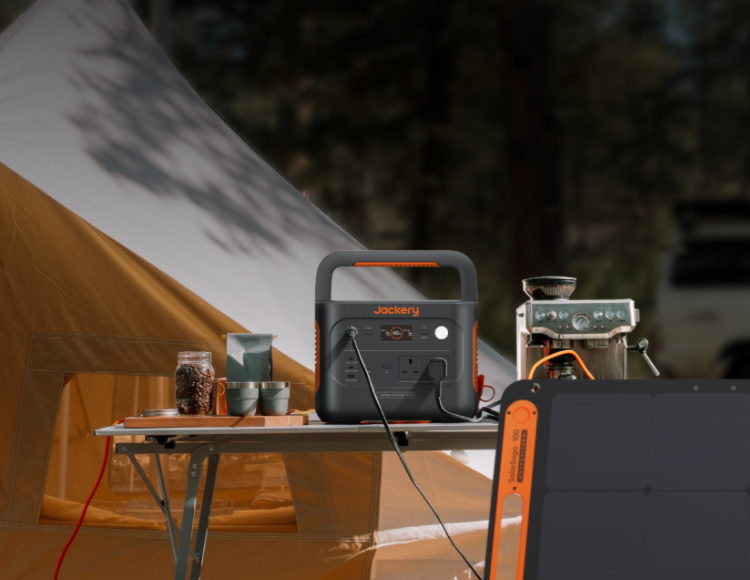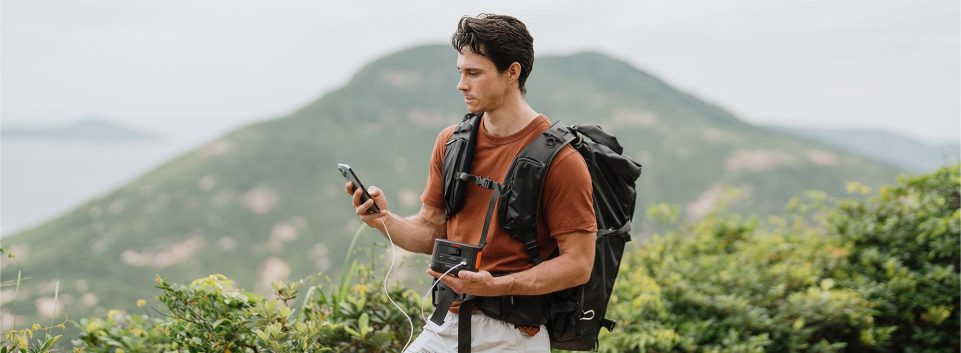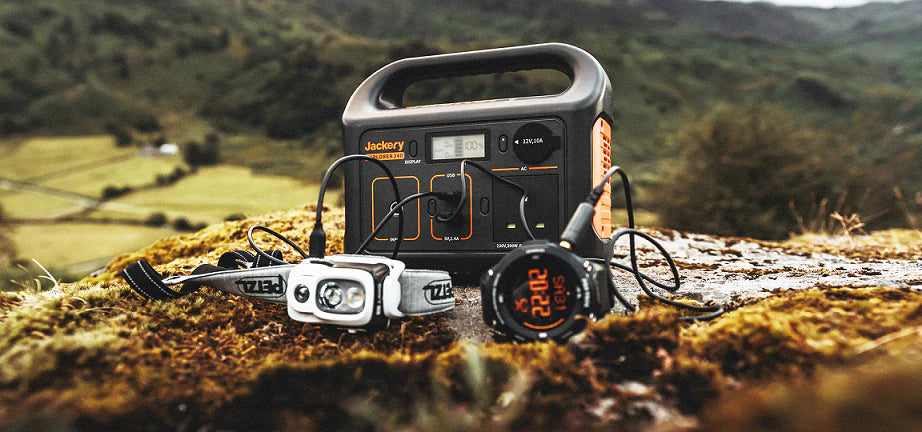The point of wild camping is to explore new areas of the UK and enjoy wide open spaces or cosy hideaways away from the crowds and the hustle and bustle of everyday life. However, it is essential to note that in England, except in some regions of Dartmoor, wild camping is typically not permitted without the landowner's consent.
Even if wild camping is allowed, rules such as leaving no trace, using open fires with caution, staying away from sensitive areas and keeping quiet at certain times must be followed. In addition, you can also learn about important things to consider, safety tips and alternatives for wild camping in the following content.
Whether you're wild camping, dispersed camping, or caravan camping, a reliable portable power source is essential. We highly recommend the Jackery Portable Power Station for charging your camping appliances and personal electronics on the go.
|
Key Takeaways: |
|
- Wild camping is generally not allowed in England, except in parts of Dartmoor, without the consent of the landowner. - Wild campers who do not leave when asked to do so by the landowner or the police may face a fine of up to £2,500, three months in prison, or both. - Wild camping rules include leaving no trace, using open fires with caution, avoiding sensitive areas, and being quiet at certain times. - When wild camping in England, it is essential to consider selecting a suitable campsite, planning your route, packing the necessary equipment, and knowing how to access the toilet facilities. - To ensure personal safety when wild camping, it is essential to closely monitor weather changes, inform relatives and friends of your itinerary, and prioritise fire prevention. - We highly recommend Jackery Explorer 1000 v2 portable power station for your wild camping in England. |
Is Wild Camping Legal in England?
As a leisurely way to connect with nature and enjoy outdoor life, wild camping has become increasingly popular among outdoor enthusiasts in recent years. However, for those who plan to go wild camping in England, the issue of legality is crucial. The following content will delve into the legal framework of camping in England, providing readers with a clear understanding of the legal boundaries of wild camping in England and helping them avoid potential risks.
Is Wild Camping Legal in England?
In England, there is no official law permitting wild camping, but it is not considered a criminal act. In England, wild camping is classified as a non-arrestable civil offence, not an arrestable criminal offence. The core principle of wild camping in England is that it is illegal to camp on private land without permission.
Most of the land in England is private land. These private lands are either managed by individuals, organisations, companies, or charities. The premise of wild camping in England is that you must obtain permission from the landowner, which dates back to the feudal system about 1,000 years ago.
Therefore, in England, wild camping is generally not permitted without the landowner's consent.
Where Can You Legally Go Wild Camping in England?
Although England is not as liberal as Scotland regarding wild camping, there are some designated areas where it is permitted. There are usually two places where wild camping is legal in Scotland:
Dartmoor National Park
Dartmoor is the only place in England where you can legally wild camp without the landowner's permission within a designated area. However, please note that wild camping is legal only in specific areas of Dartmoor National Park.
Several landowners in Dartmoor National Park have taken a case to the Supreme Court to ban wild camping on their land. On January 13, 2023, a new ruling once banned wild camping on Dartmoor. However, after a long appeal by the landowner, the Supreme Court recently ruled to maintain the legal right to wild camp on Dartmoor.
Getting Permission from the Landowner
In England, wild camping is completely legal if you get permission from the landowner in advance. Although it may sound troublesome, many landowners are more than happy to accommodate wild campers. In addition, with the landowner's permission, wild campers must also respect the land, property, and some unwritten rules of wild camping.

What Happens If Wild Camping Is Not Legal in England?
In England, if you are caught wild camping illegally (i.e. camping on private land or a public area where camping is prohibited without permission), you will usually just be asked by the landowner or police to pack up and leave. If you pack up and go, there is generally no penalty for wild campers.
However, if you do not leave when asked to do so by the landowner or police in areas of England where you are wild camping illegally, you will face the following penalties:
Eviction
The landowner has the right to ask the illegal wild camper to leave immediately. If they refuse to go, the owner can apply to the court for a possession order and may use bailiffs to evict them, if necessary, by force. The police can usually evict the illegal wild camper if the wild camper refuses to leave and causes harassment, damage or threats to the landowner. Refusing to comply with a police eviction order may constitute a criminal offence.
Fines and Imprisonment
Failing to leave the location when asked to do so by the landowner or police and then returning to the exact location after being asked to leave will constitute trespass. If the illegal wild camper refuses to cooperate, the police can take measures to arrest them to enforce compliance. Illegal wild campers may also face a fine of up to £2,500, or a prison term of up to three months, or both. If a gang is involved or the violation is repeated, the fine may be further increased. Additionally, the police have the authority to seize the vehicles and other related equipment of wild campers.
Additional Penalties
Some areas or landowners may file civil lawsuits for property damage (such as garbage and vegetation damage) caused by illegal camping, seeking compensation for land damage or cleanup costs. Additionally, wild campers who repeatedly violate the law may be included on the "banned camping list", which restricts their future activities in specific areas.
The Unwritten Rules to Follow When Wild Camping in England
When wild camping in England, in addition to complying with official regulations, there are many unwritten rules (wild camping etiquette) to pay attention to. These conventional wild camping rules not only protect the natural environment but also enhance the overall wild camping experience.

Rule 1: Leave No Trace
Remove all garbage, including food scraps, wrapping paper, and hygiene products, and leave no trace of human activity. Even seemingly biodegradable items, such as fruit peels or paper towels, can still hurt the ecological environment. Additionally, avoid cutting branches or harming plants. When wild camping outdoors, it is also essential to avoid feeding or disturbing animals.
Rule 2: Use Open Flames with Caution
Bonfires are prohibited in many areas, particularly during the dry summer months. Please try to use a dedicated brazier or camping stove. You can try to make a campfire with the landowner's permission. Ensure the fire is entirely extinguished and the ashes are cool before leaving.
Rule 3: Stay Away from Sensitive Areas
Avoid camping near farmland, historical sites, water sources or within sight of other people's homes. When camping outdoors, it is essential to maintain a distance from residential areas and roads, as everyone wants to preserve their privacy.
Rule 4: Protect Water Sources and Land
When camping outdoors, stay at least 30 metres away from water sources. Avoid washing items or disposing of sewage in natural water bodies, such as streams and lakes. Additionally, wild campers should select hard ground to set up their tents to minimise vegetation damage.
Rule 5: Keep Quiet at Specific Times
When camping outdoors in England, you usually need to keep quiet from 10 p.m. to 7 a.m. Keep your conversation volume down, and avoid using speakers or making loud noises. Even wild campers who get up early in the morning should move quietly and not disturb others' sleep.
Rule 6: Keep a Low Profile
Most outdoor enthusiasts try to minimise the impact on the wild camping area when camping in nature and refrain from occupying large areas of natural beauty. The colour of the tent should also be as low-key as possible, avoiding conspicuous fluorescent colours to reduce the impact on the landscape and others.
Essential Things to Consider When Wild Camping in England
When wild camping in England, being well-prepared can significantly enhance your experience. To be fully prepared for wild camping in England, you need to consider several key factors, including safety, regulations, equipment, and environmental protection. Here are four core things to consider when wild camping in England:
How to Choose a Campsite?
Strictly abide by British laws and avoid illegal camping on private land. Although wild camping is permitted in some areas of Dartmoor, specific regulations must be adhered to. After ensuring that the selected wild camping site is legal, it should be located in a dry, flat, open area with a well-drained surface. Wild camping sites should be avoided in areas with swamps, steep slopes, animal habitats, and streams. For example, wild camping sites must be at least 200 feet (about 60 metres) away from streams. At the same time, the entrance of the tent should be sheltered from the wind and away from rolling hills.
How to Plan a Wild Camping Route?
If you are not familiar with the place you are going to, you can check the Google satellite map first to understand the terrain. Additionally, be aware of the weather, altitude, seasonal characteristics, and travel days of the destination in advance. Select the route to the wild camping site based on your physical fitness and experience, and avoid challenging terrain that exceeds your ability. For example, the Lake District and Peak District in England have complex terrain, so it is advisable to download offline maps or use GPS devices in advance to mark emergency evacuation routes.
How to Pack Wild Camping Equipment?
It is best to adjust the amount of wild camping equipment according to the number of days and personal needs. If you are in a hurry and don't have time to think carefully, please refer to the following basic wild camping equipment list (for reference only):
|
Essential Camping Equipment List for England |
|
|
Tent Sleeping Bag Sleeping Pad Stove Lightweight Pots Tableware 1-2 Liter Water Bags Water Purification Tablets / Filters High-Energy Snacks Cash |
Toiletry Bag Garbage Bag Sun Hat Sunscreen Mosquito Spray Headlamp / Camping Light GPS Device / Offline Map Swiss Army Knife First Aid Kit Portable Power Station |
In addition to the standard camping gear, it is recommended to bring a portable power source. Wild camping means no access to traditional power outlets. A Jackery Portable Power Station provides a self-contained power source, freeing you from the limitations of battery-powered gadgets.
Unlike noisy and fume-emitting petrol generators, Jackery Portable Power Stations are virtually silent and produce no emissions. This is essential for maintaining the peace and tranquillity of a wild camping spot and adhering to "leave no trace" principles.
When packing wild camping equipment and items, please organise them in a way that makes them easy to access, such as placing frequently used items on top.

How to Go to the Toilet When Wild Camping?
If there is a toilet at the wild camping site, it is best, which is convenient and can be kept clean. If there is no facility, bring a portable changing tent to build a temporary toilet, and women can use a portable toilet or biodegradable bag inside. Alternatively, bury the stool deeply (at least 30 cm) or seal it and take it back to town for disposal after defecation. Urinating should be done far away from the camp and dispersed to avoid contaminating concentrated areas. Don't forget to put toilet paper, wet wipes and other hygiene products in garbage bags and take them away.
Jackery Portable Power Station for Wild Camping
Taking a Jackery Portable Power Station to wild camping in England can significantly enhance your experience and safety, even though "wild camping" in England often requires landowner permission (with Dartmoor National Park being a notable exception for backpackers).
It can keep your phone, satellite communicator, or GPS device charged. This is crucial for safety, navigation, and emergency contact, especially in remote areas where signals might be patchy. Power LED lanterns, headlamps, or string lights to illuminate your campsite without relying on dwindling battery life from disposable batteries.
Pair your Jackery with compatible Jackery Solar Panels. This allows you to replenish your power station's charge using the sun, extending your off-grid time indefinitely, as long as there's sunlight. This is especially useful for longer trips.
Jackery Explorer 1000 v2
Taking a Jackery Explorer 1000 v2 for wild camping in England is an excellent choice for a balance of power, portability, and modern features.

Ideal Capacity for Wild Camping: With 1070Wh, it's enough to power essential devices for several days, or even a few nights, without being excessively heavy or bulky for carrying (especially if you're not backpacking deep into the wilderness). This capacity can easily handle multiple phone charges, laptop usage, drone charging, powering LED lights, running a portable fridge (small, low-power model) for a couple of days, or even a CPAP machine for several nights.
1500W AC Output (3000W Surge): This robust output means you can power a wider range of appliances than smaller power stations. While you wouldn't bring a hairdryer on a wild camping trip, it means you can comfortably run your laptops, portable water pumps, electric kettles, and more.
Portability and Design for the Outdoors: While not ultra-light for deep backpacking, it's manageable for carrying from a vehicle to a discreet wild camping spot or for setting up a base camp. Its foldable handle makes it easier to transport. It's designed to be relatively compact, fitting well in a car boot or a larger rucksack.
LiFePO4 Battery (4000+ Cycles to 70%+ capacity): This is a huge advantage. LiFePO4 battery is far more durable and has a significantly longer lifespan than traditional lithium-ion batteries. This means your investment will last for many years of wild camping adventures.
Fast Recharging (1 Hour "Emergency Super Charging"): While you'll likely charge it via AC at home before your trip, the option for high-speed charging (1.7 hours standard via AC, or 1 hour via app-activated "Emergency Super Charging") is excellent for quick turnarounds between trips.
Solar Charging Capability (up to 400W): When paired with Jackery SolarSaga panels (e.g., 2 x SolarSaga 200W panels), you can recharge the 1000 v2 in as little as 3.8 hours of direct sunlight. This is a game-changer for extending your wild camping trips, providing truly off-grid power independence. In unpredictable English weather, having efficient solar charging is invaluable for making the most of sunny spells.
|
Jackery Explorer 1000 v2 Running Time |
|
|
Electric Kettle (600W) |
6 Times |
|
Projector (100W) |
8H |
|
Camera (8.4W) |
47 Times |
|
Portable Fridge (60W) |
15H |
|
Drone (90W) |
25 Times |
(*The working hours are only for reference; the actual working hours depend on your usage.)
Safety Tips for Wild Camping in England
When wild camping in England, safety is the key to enjoying the natural environment. In England's outdoor environment, the changeable climate, complex terrain and potential wild risks all need to be treated with caution. Here are some practical safety tips to help you avoid risks and deal with emergencies:

Safety Tip 1: Pay Close Attention to Weather Trends
England's weather is changeable, especially in the Lake District or Peak District. Before setting off, it is best to check the weather conditions using the Met Office or BBC Weather and be alert to sudden rain or strong winds. If the weather is terrible, it is best to postpone your trip.
Safety Tip 2: Tell Your Family or Friends About Your Trip
Before setting off, please inform your family and friends in detail of the camping location, route (including alternative routes) and estimated return time. If you fail to return on time, they can find out in time and call the police. Please keep your emergency contact information readily available so that you can seek help when needed.
Safety Tip 3: Rehydrate in Time
Carry enough clean water to avoid dehydration when wild camping. It is best to avoid drinking unknown water sources when wild camping. If you absolutely must, you can use water purification tablets or filters to purify the water before drinking. Some people believe that boiling wild water sources for more than 1 minute can sterilise.
Safety Tip 4: Pay Attention to Fire Prevention
In most outdoor areas in England (especially hay areas and forests), it is forbidden to light fires at will, and fire rings must be used in designated areas. Therefore, it is best to use a stove when wild camping to avoid the risk of starting a bonfire. When extinguishing a bonfire, use water to douse the embers until there is no smoke or heat, and allow the ashes to cool completely before removing them.
Safety Tip 5: Travel with Companions
In wild camping, teamwork can help to deal with most emergencies or sudden situations promptly. Therefore, it is best to travel with three people when wild camping to avoid being left alone.
Alternatives to Wild Camping in England
In addition to traditional camping, wild camping enthusiasts in England have numerous other options to enjoy nature while striking a balance between comfort and convenience. Here are some popular alternatives and their features:

Designated Site Camping
If you're having trouble finding a legal wild camping spot, consider a well-equipped fixed camping site instead. They usually are fully equipped with toilets, showers, electricity, and other amenities, making them ideal for families or beginners. Some rural camping facilities provide secluded areas where visitors can experience the spirit of wild camping without breaching any legal laws. Although these camping spots are not designated for wild camping, they can still provide a relaxing outdoor experience.
RV Camping
RV camping is extremely popular in England, particularly for long-distance excursions and family vacations. Furthermore, most RVs are small but come with convertible sofa beds, private restrooms, stoves and ovens, and even outdoor tables and chairs. If you own a camper or motorhome, consider using it for semi-wild camping. However, you must confirm in advance whether the park welcomes RVs.
Glamping is a luxurious version of camping, offering tent cabins, tree houses, and even dome houses, along with facilities comparable to those of hotels. People may also enjoy heated tents, memory foam mattresses, sheepskin blankets, champagne cooling buckets and even private butler services at luxury camping sites. For example, the treehouse at Hudson Hill in West Dorset offers a double-story, handmade treehouse equipped with a copper bathtub, an open-air shower, and a spa balcony. It is more suitable for those who seek unique experiences or couples.
Road Trip
A road trip is a fun way to experience the English countryside by driving yourself and staying in a campsite or short-term rental. Some outdoor enthusiasts, for example, choose to drive from London to Bristol, passing through Stonehenge, the chocolate-box villages of the Cotswolds, and taking in the beauty of England's heartland down the Thames Valley.
However, road excursions necessitate the use of offline maps and the willingness to detour from guidance. It is also vital to pre-check the vehicle (particularly for off-road areas) and allow enough time to take in the surroundings.
FAQs
The following are the frequently asked questions about wild camping in England.
1. Where is wild camping legal in the UK?
In most parts of England, Wales and Northern Ireland, wild camping is not allowed unless you have permission from the landowner. However, Dartmoor in south-west England is an exception. In Scotland, wild camping is permitted in most areas. However, there are some restrictions around Loch Lomond and on enclosed land.
2. Can I camp in any woods in the UK?
No. Generally, you cannot camp in any woods in the UK without permission. In most parts of England, Wales and Northern Ireland, the rules on wild camping are stringent. In Scotland, wild camping is generally permitted, but there are restrictions in certain areas.
3. Where can you legally camp for free in the UK?
In Scotland, wild camping is generally legal, especially on unenclosed land. Additionally, Dartmoor National Park permits wild camping in designated areas.
4. After obtaining permission from the landowner, what else should you pay attention to when wild camping?
While many landowners will be happy to let you go wild camping, be sure to get their permission first. In addition, there are some things to keep in mind when wild camping:
Stay away from houses, buildings, roads, farm walls and fences
Reduce the number of people and tents
Do not trample plants or move rocks
Do not light open fires
Be quiet and keep noise to a minimum
Take all your rubbish with you
Final Thoughts
Although the solitude of the wilderness may be alluring, wild camping can be daunting for first-timers. Additionally, to protect the natural environment and wildlife from harm, England has strict regulations governing wild camping. With our handy guide, campers can find out how to legally and safely go wild camping in England. When wild camping is not possible, campers can also choose to camp in designated sites, in a caravan, or on a glamping trip.






























































